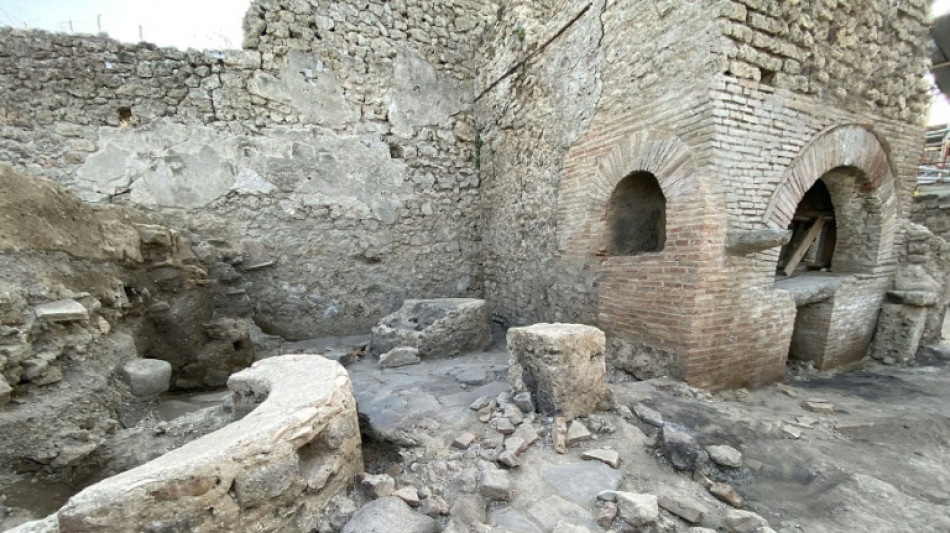
-
 France targets cheap Chinese goods with fee on packages
France targets cheap Chinese goods with fee on packages
-
Amnesty accuses Israel of 'live-streamed genocide' in Gaza

-
 Japan, Philippines leaders vow to deepen security ties
Japan, Philippines leaders vow to deepen security ties
-
AstraZeneca moves some production to US amid tariff threat

-
 Shadman's ton gives Bangladesh lead in 2nd Zimbabwe Test
Shadman's ton gives Bangladesh lead in 2nd Zimbabwe Test
-
Barca's Yamal: I admire Messi but don't compare myself to him

-
 Pfizer profits dip on lower Paxlovid sales
Pfizer profits dip on lower Paxlovid sales
-
French right-wing TV host fans talk of presidential bid

-
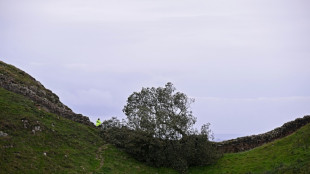 Two men in court charged with 'moronic' felling of famed UK tree
Two men in court charged with 'moronic' felling of famed UK tree
-
Amnesty accuses Israel of 'live-streamed genocide' against Gazans

-
 Spotify posts record profit in first quarter
Spotify posts record profit in first quarter
-
Sciver-Brunt named as England women's cricket captain

-
 GM profits top estimates, but automaker reviewing outlook due to tariffs
GM profits top estimates, but automaker reviewing outlook due to tariffs
-
Stock markets edge up as Trump softens tariff pain for auto firms

-
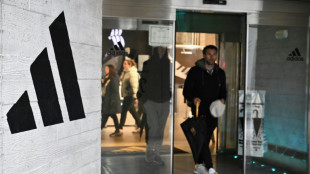 Pricier trainers? Adidas warns on US tariff impact
Pricier trainers? Adidas warns on US tariff impact
-
Spain, Portugal rule out cyberattack for massive blackout
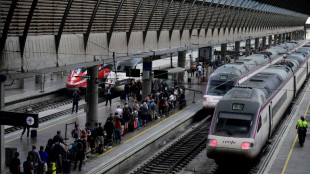
-
 Suryavanshi, 14, dubbed India's next superstar after shattering records
Suryavanshi, 14, dubbed India's next superstar after shattering records
-
Power back in Spain, Portugal after massive blackout
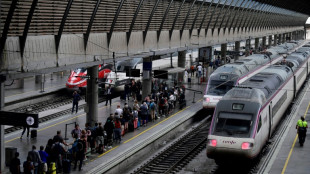
-
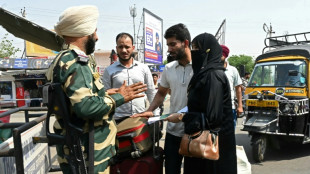 Pakistan says it shot down Indian drone along Kashmir border
Pakistan says it shot down Indian drone along Kashmir border
-
Cardinals run the media gauntlet ahead of conclave

-
 BP profit drops 70% amid pivot back to oil and gas
BP profit drops 70% amid pivot back to oil and gas
-
Iran says fire contained after deadly blast at key port
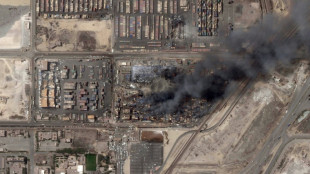
-
 Irish rappers Kneecap deny support for Hamas, Hezbollah
Irish rappers Kneecap deny support for Hamas, Hezbollah
-
Blackout plunges Spain into chaotic night of darkness
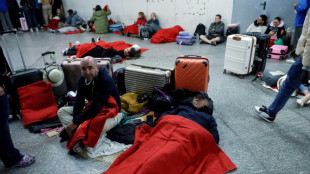
-
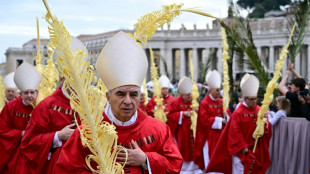 Convicted cardinal confirms he will sit out conclave
Convicted cardinal confirms he will sit out conclave
-
Kashmiris fortify bunkers anticipating India-Pakistan crossfire
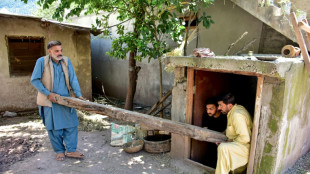
-
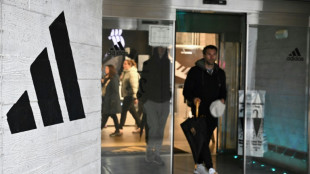 Adidas warns US tariffs to push up prices
Adidas warns US tariffs to push up prices
-
Markets boosted as Trump softens tariff pain for auto firms

-
 Suryavanshi, 14, dubbed 'next superstar' after batting records tumble
Suryavanshi, 14, dubbed 'next superstar' after batting records tumble
-
Australian doubles player Purcell accepts 18-month doping ban

-
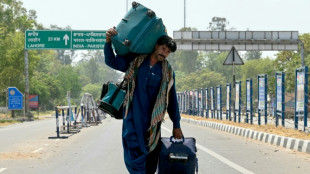 Kashmir attack unites political foes in India, Pakistan
Kashmir attack unites political foes in India, Pakistan
-
Croatia hotel toasts dizzying century of stars, sovereigns and champagne
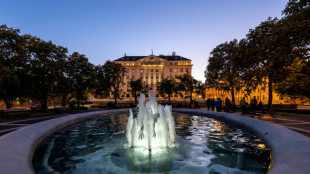
-
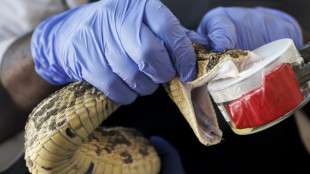 Kenya's desperate need for more snake antivenom
Kenya's desperate need for more snake antivenom
-
Les Kiss in frame with Wallabies set to name new coach

-
 Cavaliers scorch Heat, Warriors down Rockets in thriller
Cavaliers scorch Heat, Warriors down Rockets in thriller
-
Opposition wins Trinidad and Tobago election, returning Persad-Bissessar as PM

-
 Study sheds light on origin of Australia's odd echidna
Study sheds light on origin of Australia's odd echidna
-
France tries Syrian Islamist rebel ex-spokesman on war crime charges
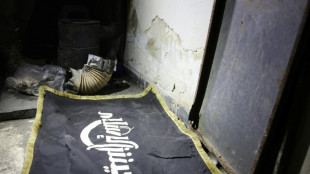
-
 Trump boasts of 'fun' 100 days, but Americans disenchanted
Trump boasts of 'fun' 100 days, but Americans disenchanted
-
Elitist no more, caviar is turning casual
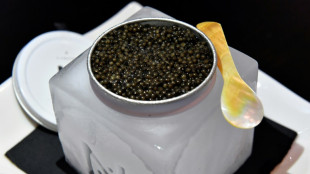
-
 Amnesty accuses Israel of 'live-streamed genocide' against Gaza Palestinians
Amnesty accuses Israel of 'live-streamed genocide' against Gaza Palestinians
-
Inter slump puts season at risk ahead of daunting Barca trip

-
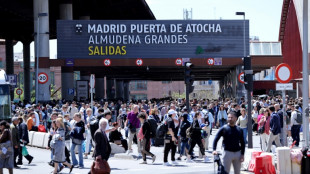 Power returns to most of Spain, Portugal after massive blackout
Power returns to most of Spain, Portugal after massive blackout
-
'I have hope': Vietnam Babylift survivor's search for birth mother

-
 US climate assessment thrown into doubt as Trump dismisses authors
US climate assessment thrown into doubt as Trump dismisses authors
-
Venezuelan president slams US over little girl's 'abduction'
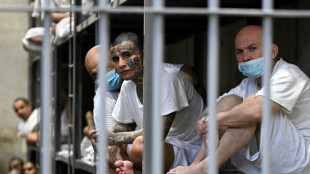
-
 Hard-right upstarts eye big gains in local UK polls
Hard-right upstarts eye big gains in local UK polls
-
Skulls, smoke and spirits: Thai ceremony for the unclaimed dead
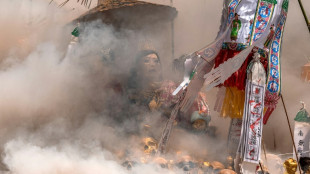
-
 Canada's Carney: political newcomer who says he's best in a crisis
Canada's Carney: political newcomer who says he's best in a crisis
-
Cavaliers scorch Heat to seal series sweep


Archaeologists discover 'prison bakery' in ancient Pompeii
Archaeologists excavating the ancient Roman city of Pompeii have uncovered a "prison bakery" where slaves and blindfolded donkeys were kept locked up underground to grind grain for bread, officials said this week.
Underneath a house in the ruins they found "a cramped room with no view of the outside world and with small windows high in the wall, with iron bars, to let the light in", the Archaeological Park of Pompeii announced on Friday.
Archaeologists deduced they had found a "prison bakery", the UNESCO World Heritage Site near Naples, southern Italy, said on its website.
They also discovered "indentations" in the floor "to coordinate the movement of the animals, forced to walk around for hours, blindfolded".
The house, on the 44-hectare site that is currently under excavation, was divided into a residential area "decorated with exquisite Fourth Style frescoes" and a "productive quarter", the bakery.
Three skeletons were discovered in one room of the bakery, showing that the house was inhabited.
The bakery, where slaves and animals were forced to perform the backbreaking task of turning the millstones, had no doors or communication with the outside world.
- 'Shocking' side of ancient world -
"It is, in other words, a space in which we have to imagine the presence of people of servile status whose freedom of movement the owner felt the need to restrict," wrote Pompeii director Gabriel Zuchtreigel in a scholarly article.
"It is the most shocking side of ancient slavery, the one devoid of both trusting relationships and promises of manumission, where we were reduced to brute violence, an impression that is entirely confirmed by the securing of the few windows with iron bars."
The public can view more evidence of this harsh daily life in an exhibition called "The Other Pompeii: Ordinary Lives in the Shadow of Vesuvius" which opens at the Palestra Grande in Pompeii on December 15.
"(The exhibition is) dedicated to that myriad of individuals often forgotten by the historical sources, such as the slaves, who constituted the majority of the population and whose labour contributed in an important way not only to the economy, but also to the culture and social fabric of Roman civilization," the Pompeii authorities said.
Pompeii was devastated when nearby Mount Vesuvius erupted almost 2,000 years ago in 79 AD.
The ash and rock helped preserve many buildings almost in their original state, as well as forming eery shapes around the curled-up corpses of victims of the disaster, thought to number around 3,000.
Pompeii is the second most visited tourist destination in Italy after the Colosseum in Rome.
Ch.Kahalev--AMWN


